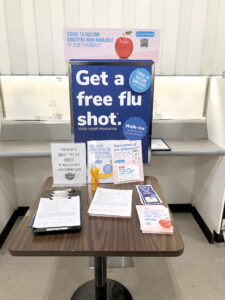
By Judy O’Gorman Alvarez
After a slight reprieve because last year’s COVID-19 precautions also worked for other viruses, flu season is back. And once again health care professionals are touting the importance of getting the annual influenza vaccine – or flu shot.
But many New Jerseyans are slow to roll up their sleeves yet again.
Maybe they’ve had their fill of vaccinations, jabs or needles and are experiencing inoculation fatigue. Maybe they’re lulled into a false sense of security because of last year’s all-time low infection rate of the flu – thanks to social distancing and mask-wearing. Nevertheless, according to the Centers for Disease Control and Prevention, flu season in the U.S. normally claims tens of thousands of lives each year.
“Every year it is important to get flu shots because we have flu infections every year,” said Andrew Lee, M.D., chief of Infection Control at Monmouth Medical Center. “Last year was an exception because I think everybody was wearing a mask.” Lee believes this year more people are lax about wearing masks. “And already we are seeing several cases of flu infection,” he said, noting that he also thinks we’ll see more cases as the season progresses.
“Patients may be fatigued from all this talk about COVID,” said Lee. “But, you know, flu is a different infection. And it can cause severe illness. Obviously for patients who are older and have more medical issues, that can be more of a problem. But you definitely need to protect yourself from that. Yes, it is different from COVID. But it is a different infection that can cause significant morbidity.”
Even though she has worked in the medical field for 30 years, Lori DeSantis of Atlantic Highlands never got a flu shot. “I thought, basically, I am pretty healthy,” said DeSantis, who works in radiology.
But her flu-shot reluctance changed eight years ago when her husband got the flu and was so ill he required two trips to the emergency room. Now, she, her husband and 27-year-old son make a point to be vaccinated every year.
“On a daily basis I have exposure to patients getting over illnesses, including the flu and COVID,” she said, which she explained is all the more reason to take safety precautions like getting vaccinated.
Stephanie Cartier of Lincroft also was not a flu-shot fan and didn’t think she needed one. “I had only gotten it once before when the media scared the bejesus out of me several years ago,” she said.
She changed her mind when her daughter, who has Down syndrome, was going away to college and Cartier thought it best to have her vaccinated. “If she got sick, she would be so far from me,” Cartier said. “I got it so we’d be simpatico.”
Now mother and daughter get the yearly flu vaccine together. “We’ll do it Thanksgiving weekend,” she said.
Although Stephen McGeever of Lincroft has been vaccinated against COVID-19 he’s going to pass on the flu shot again this year. “I have never gotten the flu or the flu shot so I don’t think I need it,” he said. “I think I’m healthy enough to not get it and/or get over it quickly if I did.”
What makes this year’s flu season a little more ominous is the fact that COVID-19 is still prevalent. So how do you know which one you have?
“Symptoms can be very similar,” said Lee. “Sometimes with flu you can just have fevers, generalized aches, not feeling well and fatigue. But you know, COVID can have those kinds of symptoms, too. So it will be tricky if we do have flu cases during winter time.”
“Right now because of the prevalence of COVID, I recommend patients get tested for COVID” if they start experiencing those symptoms, he said.
COVID-19 tests are readily available, either at a medical facility or with in-home test kits. But if you test negative for COVID and you’re still not feeling well, then Lee recommends going to a physician’s office for a rapid flu test. If caught early enough, the flu can being treated with Tamiflu, an antiviral medication that blocks the actions of influenza virus, which can greatly help symptoms and speed recovery.
According to the CDC, for both COVID-19 and the flu, one or more days can pass between when a person becomes infected and when he or she starts to experience symptoms. But if a person has COVID-19, it could take them longer to experience symptoms than if they have flu.
With the flu, typically, a person experiences symptoms anywhere from one to four days after infection. Symptoms include fever or feeling feverish, chills, cough, sore throat, runny or stuffy nose, muscle or body aches, headaches and fatigue. Some people may have vomiting and diarrhea as well. It’s also important to note that not everyone with flu will have a fever.
With COVID-19, typically, a person experiences symptoms about five days after being infected. But symptoms can appear anytime between two and 14 days after infection, which is why quarantine recommendations are for a two-week period after potential contact. Symptoms include fever or chills, cough, shortness of breath or difficulty breathing, fatigue, muscle or body aches, headache, new loss of taste or smell, sore throat, congestion or runny nose, nausea or vomiting or diarrhea.
The article originally appeared in the November 4 – 10, 2021 print edition of The Two River Times.














